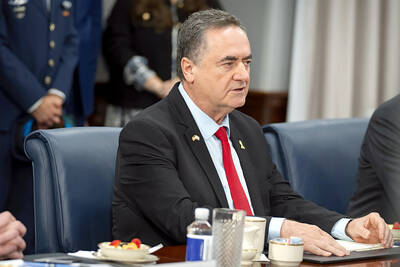Italian Prime Minister Silvio Berlusconi’s government, which has already put several thousand soldiers on the streets of Italy, was yesterday to legalize vigilante patrols and set out the guidelines under which they can operate.
The plans prompted an outcry from opposition politicians and police unions, but got a mixed reception from Italy’s mayors, who must decide whether they want law enforcement volunteers in their towns. An overwhelming majority of those in favor run cities in the north, where the anti-immigrant Northern League has long argued for wider use of vigilantes.
The interior minister, Roberto Maroni, a member of the Northern League, denied that the plan was to introduce vigilantism to Italy: “The decree does not create [vigilante] patrols; it regulates them.”
After rejecting the scheme, Rome’s mayor, Gianni Alemanno, a former neo-fascist, appears to have embraced it. The head of his council’s security committee, Fabrizio Santori, said vigilantes in fluorescent jackets would be deployed in parks, outside schools and at tourist sites.
Taking advantage of a gap in existing legislation, volunteers have formed groups to carry out patrols in cities including Milan, Padua, Parma and Bologna.
Last month vigilante groups from the left and the right clashed violently in the Tuscan town of Massa Carrara.
The rules will restrict groups such as the Italian National Guard, which is being investigated by a prosecutor in Turin. The Guard, which claims 2,000 members, has a reconnaissance plane and a uniform, complete with armbands, reminiscent of the Nazi SA.
But one of the biggest existing groups, the Milan-based City Angels, which focuses on social work as much as crime prevention, expressed concern that the guidelines would be too restrictive.
The leader of Italy’s biggest opposition group, Dario Franceschini of the Democratic party, called the use of vigilantes “demagogic and dangerous.”

STEPPING UP: Diminished US polar science presence mean opportunities for the UK and other countries, although China or Russia might also fill that gap, a researcher said The UK’s flagship polar research vessel is to head to Antarctica next week to help advance dozens of climate change-linked science projects, as Western nations spearhead studies there while the US withdraws. The RRS Sir David Attenborough, a state-of-the-art ship named after the renowned British naturalist, would aid research on everything from “hunting underwater tsunamis” to tracking glacier melt and whale populations. Operated by the British Antarctic Survey (BAS), the country’s polar research institute, the 15,000-tonne icebreaker — boasting a helipad, and various laboratories and gadgetry — is pivotal to the UK’s efforts to assess climate change’s impact there. “The saying goes

Police in China detained dozens of pastors of one of its largest underground churches over the weekend, a church spokesperson and relatives said, in the biggest crackdown on Christians since 2018. The detentions, which come amid renewed China-US tensions after Beijing dramatically expanded rare earth export controls last week, drew condemnation from US Secretary of State Marco Rubio, who on Sunday called for the immediate release of the pastors. Pastor Jin Mingri (金明日), founder of Zion Church, an unofficial “house church” not sanctioned by the Chinese government, was detained at his home in the southern city of Beihai on Friday evening, said

TICKING CLOCK: A path to a budget agreement was still possible, the president’s office said, as a debate on reversing an increase of the pension age carries on French President Emmanuel Macron yesterday was racing to find a new prime minister within a two-day deadline after the resignation of outgoing French Prime Minister Sebastien Lecornu tipped the country deeper into political crisis. The presidency late on Wednesday said that Macron would name a new prime minister within 48 hours, indicating that the appointment would come by this evening at the latest. Lecornu told French television in an interview that he expected a new prime minister to be named — rather than early legislative elections or Macron’s resignation — to resolve the crisis. The developments were the latest twists in three tumultuous

FIRST STAGE: Hamas has agreed to release 48 Israeli hostages in exchange for 250 ‘national security prisoners’ as well as 1,700 Gazans, but has resisted calls to disarm Israel plans to destroy what remains of Hamas’ network of tunnels under Gaza, working with US approval after its hostages are freed, it said yesterday. Israeli Minister of Defense Israel Katz said that the operation would be conducted under an “international mechanism” led by the US. “Israel’s great challenge after the hostage release phase will be the destruction of all Hamas terrorist tunnels in Gaza,” Katz said. “I have ordered the army to prepare to carry out this mission,” he added. Hamas operates a network of tunnels under Gaza, allowing its fighters to operate out of sight of Israeli reconnaissance. Some have passed under